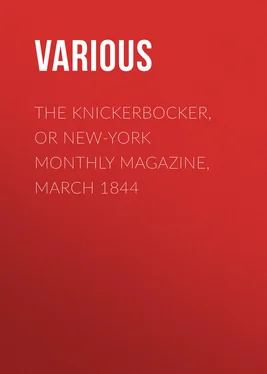Various - The Knickerbocker, or New-York Monthly Magazine, March 1844
Здесь есть возможность читать онлайн «Various - The Knickerbocker, or New-York Monthly Magazine, March 1844» — ознакомительный отрывок электронной книги совершенно бесплатно, а после прочтения отрывка купить полную версию. В некоторых случаях можно слушать аудио, скачать через торрент в формате fb2 и присутствует краткое содержание. Жанр: foreign_antique, periodic, foreign_edu, на английском языке. Описание произведения, (предисловие) а так же отзывы посетителей доступны на портале библиотеки ЛибКат.
- Название:The Knickerbocker, or New-York Monthly Magazine, March 1844
- Автор:
- Жанр:
- Год:неизвестен
- ISBN:нет данных
- Рейтинг книги:5 / 5. Голосов: 1
-
Избранное:Добавить в избранное
- Отзывы:
-
Ваша оценка:
- 100
- 1
- 2
- 3
- 4
- 5
The Knickerbocker, or New-York Monthly Magazine, March 1844: краткое содержание, описание и аннотация
Предлагаем к чтению аннотацию, описание, краткое содержание или предисловие (зависит от того, что написал сам автор книги «The Knickerbocker, or New-York Monthly Magazine, March 1844»). Если вы не нашли необходимую информацию о книге — напишите в комментариях, мы постараемся отыскать её.
The Knickerbocker, or New-York Monthly Magazine, March 1844 — читать онлайн ознакомительный отрывок
Ниже представлен текст книги, разбитый по страницам. Система сохранения места последней прочитанной страницы, позволяет с удобством читать онлайн бесплатно книгу «The Knickerbocker, or New-York Monthly Magazine, March 1844», без необходимости каждый раз заново искать на чём Вы остановились. Поставьте закладку, и сможете в любой момент перейти на страницу, на которой закончили чтение.
Интервал:
Закладка:
She was told it was her duty to place her daughter in some family to be brought up as a servant. In vain did she assert her ability to maintain herself and child when health should return. Her advisers could little sympathize with her feelings, and reproached her with pride. And she was now harassed with the fear that her delicate and cultivated little girl would be torn from her, and made a factory slave or household drudge; for such power had the laws given to the rulers of the town. But this fear, miserable as it was, was now overpowered by another. The suggestion had reached the ear of the unhappy woman that she and her child would be conveyed to the house of the town’s poor, the place we have attempted to describe. God grant that no fair reader of this homely but too true story should ever feel the misery which this fear inflicted on the mind of this friendless mother! Oh, that true Charity had been present in the person of her best representative on earth, a sensible, affectionate and liberal-minded woman, to minister to the wants, to soothe the mind of her unhappy sister-woman, and cheer her exertions for self-support! None such appeared, and the heart of the poor woman sank within her. Her exertions were paralyzed; for struggle as she might to avoid it, the alms-house, with its debased and debasing society, was ever before her eyes as her ultimate destiny. It was in vain that she endeavored to prepare her mind for this result. She could endure any degree of privation, but not degradation and infamy.
Time wore on, without any renewed hints of interference, and she began to hope that she was forgotten. Delusive hope! It was felt as a disgrace that she should suffer, when the law had provided a remedy, and they had paid for it. And it was therefore decreed by the magnates of the town that she must be removed, and the day had arrived (with which we commenced our narrative,) on which the paupers were to be disposed of for the coming year. Deacon S– was the person deputed by his colleagues, as we have mentioned, to convey Mrs. Selden and her daughter to the alms-house.
However prepared we may suppose ourselves to meet misfortune, the moment of its arrival takes us by surprise. We will not attempt to picture the utter desolation of mind and the despair which filled her heart, when this man arrived at her door, to convey herself, and oh! far worse, her innocent and intelligent child, to that scene of vice and debasement. Although her dislike to the measure was known, yet from her quiet and reserved manners, little opposition was anticipated. The evils of life had accumulated upon her in a regular gradation, and she had been enabled to bear their weight, up to this point, with outward composure; looking forward to, but yet hoping this last cup of bitterness would never be presented; or if presented, that some means might be found to avert it. But the dreadful crisis had arrived. Had the whole board of authority been present, I should be glad to believe, for the honor of humanity, that they would have been moved to relent, as they would not have been able to shift the responsibility from one to the other, as is the wont of such bodies when the members act separately.
When the poor woman had so far recovered from the first shock as to be enabled to articulate, she pleaded her ability to maintain herself without assistance, and her choice rather to starve than be removed. She appealed to him as the father of a daughter, and painted the ruin which would fall upon her own, exposed to the corruption and example of the place to which he was taking her. She appealed to him as a Christian, and reminded him that they had sat together before the sacred desk, and partaken of the symbols of the body and blood of the Son of Him who was in a peculiar manner the father of the widow and orphan. But her auditor was destitute of the imagination which enables the possessor to enter into the feelings of another; and these affecting appeals fell dead upon his worldly and unsympathizing nature. The man even extended his hand to urge her forward to the conveyance provided! At that moment, when all hope was dead within her, and the worst that could happen in her opinion had arrived, a change came over the unhappy woman. She suffered herself unresistingly to be led forward to her doom. The fine chords of the mind and heart, lately so intensely strung, had parted; her countenance relaxed, and her features settled down into a dead, unmeaning apathy; never again, during the short remainder of her life, to be animated by one gleam of the feelings which had so lately illumined but to destroy.
My kind, my indulgent mother! Her generous heart needed not the eloquence of my youthful feelings to induce her to rescue the poor orphan, and to cherish her as her own child. And never was kindness more richly–
I had proceeded thus far in writing this narrative, when I discovered that I was overlooked; and a gentle voice over my shoulder said: ‘You should not praise your own wife; it is the same as if you should praise yourself!’
E. B.APOSTROPHE TO HEALTH
Hygeia! most blest of the powers
That tenant the mansions divine,
May I pass in thy presence the hours
That remain, ere in death I recline!
Dwell with me, benevolent charm!
Without the attendance of health
Not the smiles of affection can warm,
And dull are the splendors of wealth.
The pageant of empire is stale
That lifts men like gods o’er their race,
And the heart’s thrilling impulses fail
When Love beckons on to the chase.
Whate’er in itself joy can give,
Or that springs from sweet respite of pain,
That mortals or gods can receive,
Blest Hygeia! is found in thy train!
Thy smile kindles up the fresh spring,
The glad, verdant bloom of the soul;
Thee absent, our pleasures take wing,
And Sorrow usurps her control.
ISABEL
Hush! her face is chill,
And the summer blossom.
Motionless and still,
Lieth on her bosom.
On her shroud so white,
Like snow in winter weather,
Her marble hands unite,
Quietly together.
How like sleep the spell
On her lids that falleth!
Wake, sweet Isabel!
Lo! the morning calleth.
How like Sleep!—’tis Death!
Sleep’s own gentle brother;
Heaven holds her breath—
She is with her mother!
ONE READING FROM TWO POETS
——My imagination
Carries no favor in it but Bertram’s.
I am undone; there is no living, none,
If Bertram be away.
Should God create another Eve and I
Another rib afford, yet loss of thee
Would never from my heart.
I have this evening, while seated in my lonely chamber, ventured—not, I hope, with profane hands—to draw one inappreciable gem from out of the carcanet of each of the two unrivalled masters of the poetry of our language. I was curious to see the effect to be produced by a close juxtaposition of these two exquisite specimens of the soul’s light; of the revealment of its original genius; of the intense brilliancy of its Truth, falling as it does in one ray upon two objects so diverse in their character as the virgin love of the retired and comparatively humble but devoted Helena, and the married constancy of the Father of our race.
The effect reminds me of an échappée de lumière that I once beheld in the gallery of the Vatican, when a sudden emergence of light brightened with the same gleam the calm face of the Virgin of the clouds, (called di Foligno,) and at the same instant illuminated the whole principal figure in the Transfiguration of Raffaelle; floating as it does, and tending almost with a movement upward, in the air of ‘the high mountain’ where the miracle took place–as these two grand paintings then stood, side by side, in the solemn, in the holy quiet of that lofty and sequestered apartment. O moment! never to be forgotten, never to be obscured by any lapse of after time!
Читать дальшеИнтервал:
Закладка:
Похожие книги на «The Knickerbocker, or New-York Monthly Magazine, March 1844»
Представляем Вашему вниманию похожие книги на «The Knickerbocker, or New-York Monthly Magazine, March 1844» списком для выбора. Мы отобрали схожую по названию и смыслу литературу в надежде предоставить читателям больше вариантов отыскать новые, интересные, ещё непрочитанные произведения.
Обсуждение, отзывы о книге «The Knickerbocker, or New-York Monthly Magazine, March 1844» и просто собственные мнения читателей. Оставьте ваши комментарии, напишите, что Вы думаете о произведении, его смысле или главных героях. Укажите что конкретно понравилось, а что нет, и почему Вы так считаете.












